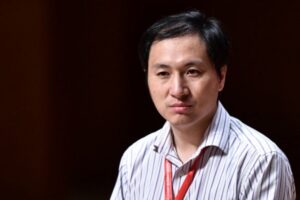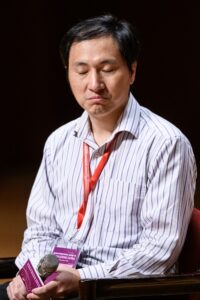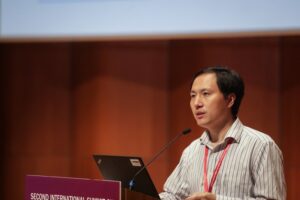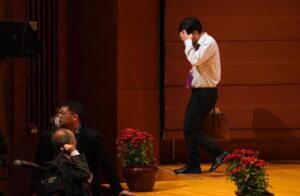Andrea FischerFebruary 8, 2023

Chinese scientist He Jiankui reacts during a panel discussion after his speech at the Second International Summit on Human Genome Editing in Hong Kong. | Credit: Anthony WALLACE / AFP
He Jiankui, the scientist who created a pair of genetically modified twins, returns to his research after 3 years in prison.
“I did everything very quickly,” confesses He Jiankui, a biophysicist specializing in gene editing at the University of Science and Technology of China. After carrying out one of the most dangerous, risky and ethically questionable experiments of the 21st century, the specialist spent 36 months in prison. Now, with his sentence served, his intention is clear: to return to science to cure diseases in adults and children by altering their DNA.
Not only that. The investment required to return to his genetic research work requires a huge investment . With much less hair than before, a criminal record that few scientists have access to and the gaze of the world upon him, this is the new professional path that the Chinese geneticist wants to follow from now on.
The case of ‘Lulu’ and ‘Nana’
The scandal boiled over in 2018. He Jiankui gave a speech on the feasibility of gene editing in human embryos at the Second International Summit on Human Genome Editing. Held in Hong Kong, it was the first time the geneticist confirmed that he had made alterations to the DNA of human babies .
The event’s organizers, the media, and virtually the entire scientific community that devotes its efforts to genetics called him irresponsible . Even so, during the press conference, the Chinese researcher answered all the questions calmly .

He Jiankui at the Second International Summit on Human Genome Editing. | Credit: Anthony WALLACE / AFP
As the world watched from the auditorium of Hong Kong University, He Jiankui spoke about how he modified the DNA of twin sisters , still in embryonic stage. He nicknamed them «Lulu» and «Nana» respectively. According to AFP ‘s coverage , He Jiankui was not upset, he was not upset. He did not apologize.
Instead, he explained his methodologies and intentions for the future with a gentle and clear tone . The media, his colleagues and patrons did not receive the speech with the same disturbing calm. A year later, he would find himself behind bars.
Where are the genetic twins?

He Jiankui talks about his experiments at the Hong Kong conference. | Credit: SC Leung/SOPA Images/LightRocket via Getty Images
This is not the first time that humanity has tinkered with the genetic material of living species . On the contrary, this is a widely accepted practice in scientific research. Precisely, as He claims, to understand — and potentially cure — diseases for which there are no treatments yet .
Yet such efforts can easily be perverted. In the 20th century, for example, members of the Nazi Party experimented on the bodies and genetic material of hundreds of people in the name of xenophobic discourse. Thus, when it comes to editing human DNA, sensitive nerves are always touched in scientific experimentation .
The fact that He Jiankui is returning to scientific research has revived the debate about his original experiment. With Lulu and Nana, the Chinese geneticist wanted to eradicate AIDS from their genetic code , since the parents of both girls were infected. To do this, he used the CRISPR tool to edit the genome of the embryos. And he succeeded.
Although the news was initially met with fanfare, it soon emerged that the scientist had violated the ethical standards imposed by the authorities . Even so, the girls were born in 2019. Their whereabouts are one of China’s best-kept state secrets in history.
Terror and scientific emptiness

He Jiankui says goodbye at his Hong Kong conference, where he presented the case of Lulu and Nana. | Credit: TPG/Getty Images
2023 brought a new lease of life for He Jiankui. Now free, the researcher intends to resume his line of work from before his time in prison. Despite his desire to continue working on genetic editing of the human genome, the Chinese geneticist refuses to give in-person interviews .
This was confirmed by Nuño Domínguez, editor of ‘Materia’, the science section of the newspaper El País . Regarding how the Chinese researcher lives now, he responded in an email to the newspaper as follows:
Now, instead of working under an educational institution, he rented a 100-square-meter office in Daxing , a district of the Chinese capital. From there he will continue his research work with two former collaborators, who encourage him to continue altering human genetic material to cure diseases written in the code.
He Jiankui likes to refer to this space, which has no specialised team or the backing of any institution, as a ‘laboratory’. «My aim is to get 137 million euros from the founder of the Alibaba portal and other multimillionaires,» declared the specialist, to the horror of the scientific community . It remains to be seen whether SoftBank, the multinational group that heads the logistics company, is interested in collaborating with him.
https://www.ngenespanol.com/ciencia/he-jiankui-como-crear-bebes-modificados-geneticamente/
12/13/2024

1 Comment
Rubén Torres
8 meses agoAbría que fusilar a todos los implicados que enjuiciaran y encarcelaron a He Jiankui. Pues este señor solo intenta que desaparezcan todas las enfermedades posibles.